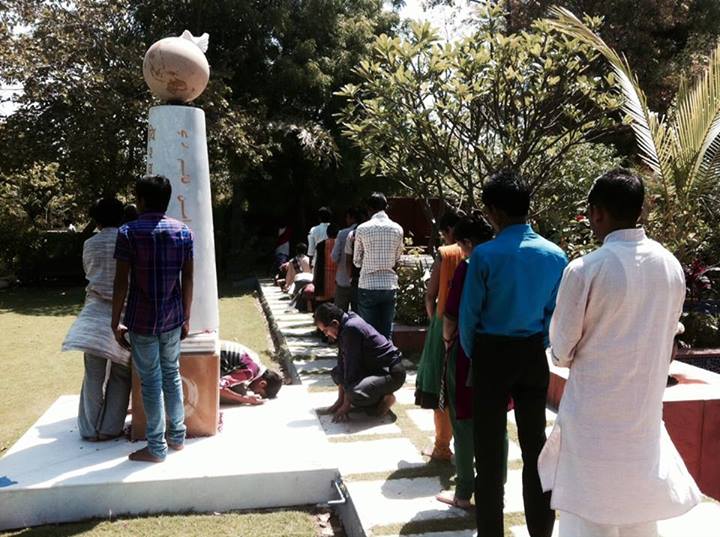Gramshilpi Retreat

A three day retreat was organised by moved by love volunteers at Sughad especially for the Gramshilipis. “Gramshilipis” as the word says are the architects of a village who serve in villages which are highly underdeveloped and in need of basic facilities like roads, primary education, electricity, sanitation etc. The nine gramshilips had qualification ranging from bachelors in Education to Masters in Social work from Gujarat Vidhyapeeth, founded by Mahatma Gandhi. Keeping ladder ship in mind, Gramshilpis brought young leaders studying in 10th and 12th grade who are serving the village.
Each day was focused on themes – “Dosti-Disha-Drasti” which means Friendship-Direction and Vision with a message of oneness as Vinoba Bhave says, "I am in everybody and in me I have everybody".
In the introduction session on the first day it was interesting to know stories from different Gramshilpis about how they ended up in a village where they have never been before and offered their services full time by staying there in the village, understanding the whole eco-system and then taking up steps in order to dissolve blocks and enhance each ones journey by supporting them in taking small steps.
Ashok bhai, joined Neelam bhai in Khoba village near Gujarat-Maharastra border, where one has to walk for at least 10 kms to reach that village from the last bus stop. Both choose to be in a village where there were no basic facilities like roads, transport, electricity, school, medical facilities etc. Even though they did not have enough food or any infrastructure for children to stay or to educate them, they opened up their living place as a hostel and school and started teaching them value education through games, stories and daily activities and prayers. There was a time when Ashok bhai had to bathe the children, wash clothes of 50 children, cut their nails and take care of their health too, but now the children have taken up roles where the elder kids are taking care of the young kids and teaching them cleanness (cleanliness) and hygiene. Because there was lot of alcohol consumption in the village, he tried two approaches – “Mulya Shikshnam” – value education rather than blindly following textbook knowledge. Secondly he conspired elderly people (above 50 yrs.) to create “Bhajan Mandali (group of people perform devotional songs and prayers) with an idea to use prayers as a tool to reduce alcohol consumption.
Jayshree ben works in a tribal village called “Andharyu” which literally means darkness, where after 4 PM women can’t move around given availability of cheap alcohol (a pouch for 10 cents). The consumers indulge in theft and violence to get the money. Jayashree, despite not having a proper home, stays in the Panchayat office about four kms away from the village and walks bravely in the village. She shared that before some years she would not work when the sun was right above her head but now every day she walks for her temporary residence up to the village. The primary school has three teachers to teach students from grade 1(I) to grade VIII. She shared that even though the children are in eighth grade they don’t know how to read and write. Very beautifully she shared that, “I thought I was here to help children and women but more than helping them I am learning here”.
Dashrath Bhai another inspiring Gramshilpi shared about the only source of water - a small pond, where the cattle’s and villagers take bath, wash clothes and on top of that people use the same water to drink and prepare food. Every day he would walk for 9 kms to and fro as there were no transport facilities. They had a school with no teachers. Now the scenario has changed. A community library has opened for children. They have started sharing newspapers along with General knowledge sessions. They have prayer sessions, nursery rhymes and laughter sessions. He shared that when he was studying he had to learn how to make brooms, that time he did not like making it, later when he started working in the village, valuing his learning he started making brooms. The one he is using today was made in the year 2009. He wondered how out of this learning we can make our own tools that we use in our daily lives. And the way we make, the way we take care of our daily tools defines our values.
Auna stays with people affected with leprosy and has formed a loving community here. Her father has a history of leprosy and she has grown with him and people affected with it. Leprosy as we know was and still is seen as a threat. People discarded them and they were forced to stay in the outskirts. She has seen and gone through that journey where she shared that the place where she stayed was called as Bhikhare nagar (Beggars place) because people who had leprosy generally have disfigured palms and because of that they can’t work and they generally ask for alms and in a way they were seen as beggars. And after years of work there has been a transformation where now this place is called Gandhi Ashram as values of Gandhiji are taught, learnt and lived here. It was so inspiring to see how in her adolescent age she is working with so much love where still people think twice to enter.
Everyone expressed gratefulness to Sureshbhai, the convener of the retreat, who has travelled and stayed in more than 700 villages to spread awareness about sanitation, health and nutrition while being the change agent. Sureshbhai thanked everyone for echoing the essence of Vinoba’s message “the soul aim of my life is to connect heart to heart”.
Everyone in the retreat including the staff at Sugadh, ladders, Gramshilpis, young leaders felt interconnected and experienced themselves in everyone.
Posted by Kishan Laddha on Apr 25, 2014 | permalink
